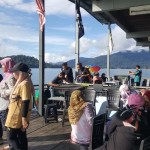By understanding these dimensions, Islamic economics seeks to balance material needs with spiritual fulfillment and social responsibility. This paper examines the implications of unlimited human wants in the context of these Islamic relationship dimensions.
The Assumptions of Unlimited Human Wants in Islamic Economics
Islamic tasawur in the human will involves two dimensions of the relationship. The first dimension of the relationship is the vertical relationship between “MAN - ALLAH AZZA WA JALLA”. In support of this assertion, our relationship with Allah SWT will determine the mode of relationship with fellow servants, those that come. The second dimension of the relationship is the horizontal relationship dimension. Horizontal relationship dimensions are shaped into three types of relationships. First, the relationship between “MAN - HIMSELF”. Second, human relationships with other human beings. Third, human relations with the environment that includes flora, fauna and other forms of life. In our study, the environment can be segregated into goods and services in economic activity. The horizontal dimensions of the relationship between “Man-Himself” can be described as follows (the vertical dimensions of the relationship are discussed in another chapter).
The Relationship Dimension of Habl Min al-Nas- Self- Want/Lust
Habl min al-nas is the second component of the Islamic religion. In the context of the study of the unlimited human wants, the components of habl min al-nas can be broken down into three parts—first, habl min al-nas from a personal point of view related to the wants. Second, habl min al-nas from human relations concerning consumption. Third, habl min al-nas from the point of human connection with the environment concerning natural resources.
Habl min al-nas from the standpoint of the self is related to the human being's inner self. More specifically, does it relate to how the level of human desire or appetite affects the level of consumption? Therefore, more clearly, this second relationship dimension can be illustrated in Fig. 1.
The Y-axis in Fig. 1 represents the level of usefulness, while the X-axis represents the level of appetite. The curve marked M refers to humans. As found in Fig. 1, low-lustful people such as lust, lawlessness and lust will be more likely to fulfil their desires beyond limits and cruelty. Their minds are controlled by unethical development found in their heart-implying the formation of behaviour that sparks negativity at the expense of positivity. This statement is in line with the word of Allah SWT in Surah Ibrahim (14:34), al-Anbiya' (21:37), al-Kahfi (18:54) and al-Ahzab (33:72).
These verses explain how human beings tend to overstep and be cruel to themselves if they have low self-esteem, leading to unlimited wants. Therefore, based on Fig. 1, when low-energy people tend to go beyond the limit, their wants to reach the highest level of consumption is beyond the level of tahsiniyyat. At this stage, they are more likely to have luxury goods and services and to exceed the boundaries. This situation can be illustrated in Fig. 1 through A's position as such. When evil desires dominate the throne, all requirements relating to goods and services will exceed that of Islam.

Fig. 1. The relationship between the level of consumption and the lust level.
However, if a human can control their passions to a better level, at least in their hearts, people will be able to control their level of usefulness to those who do not cross the line. They will be satisfied with the more appropriate levels of consumption such as daruriyyat and hajiyyat as well as tahsiniyyat if they are able and already meet the consumption level of hajiyyat and hajiyyat. This is in line with the word of Allah SWT in Surah Muhammad (47:17) and al-Hadid (957:17).
For them, goods and services are not the main goals, but their main goal is the blessing of Allah SWT translated through the use of those goods. The main goal of getting the pleasure of Allah SWT is also in line with the word of Allah SWT in Surah al-Nisa' (4:65), al-Taubah (9:59) and Muhammad (47:26).
The condition of those who make the blessing of Allah SWT as their primary goal can be illustrated in Fig. 1 through B's position. Therefore, it can be concluded that the better the lust and the higher the lust level, the lower and lower the level of consumption. Likewise, the worse the lower the level of lust, the higher the level of consumption.
Conclusion
In Islamic economics, strong faith in Allah SWT encourages moderation and ethical consumption, limiting desires to basic needs and preventing excess. Weak faith, on the other hand, leads to uncontrolled wants and excessive consumption, highlighting the importance of spiritual guidance in economic behavior. The balance between fulfilling human wants and maintaining ethical standards is crucial for sustainable and responsible economic practices. Ultimately, Islamic economics underscores the role of faith in managing human desires and promoting a just and balanced society.











